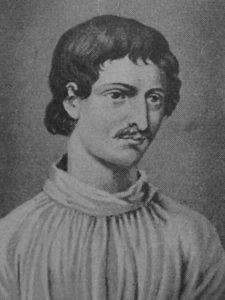
By Hayward Gladwin
Born in 1548 in Nola, Italy, Giordano Bruno was a philosopher, mathematician, poet and all-around mystic whose life would appear as nothing less than the summary of the rich influences having emerged and spread throughout mid-Renaissance Europe. Having studied his core studies in Naples (which had included the humanities of logic, metaphysics and dialectics among others) Bruno arrived as a well educated and highly advanced novitiate from the Dominican order at the monastery San Domenico Maggiore.
In 1572, he was even ordained as priest within the order. Yet, with his strong criticisms of the common theological doctrines of the time, as well as his quite unorthodox views on subjects that were largely influenced by Neo-Platonism, he was eventually accused of heresy by the Catholic Church In 1576.
In reaction, Bruno fled and spent the next 16 years of his life bouncing around from place to place. In Italy, he spent time in Venice, Padua and Bergamo. From there he wandered over the alps and spent time in Chambery, Geneva and Lyons. He received his doctorate in Theology in Toulouse and for a time he lectured in Paris. He traveled to England, spent some time at Oxford, presented his ideas to others before moving back to Paris and then later to Germany. He spent some years lecturing in Wittenberg then he was off to Prague and then back to Germany.
During this period, a time which lasted about 16 years, it seems Bruno faced problems wherever he went. In Geneva in 1579, he was ostracized by local Calvinists. In Toulouse, he was denied absolution by the Catholics. In England, he faced rejection of his ideas from his scholarly peers. In Germany, he was dismissed as a lecturer for his bent towards Aristotelian philosophy. He was excommunicated by the Lutherans in Helmstedt. And then, at the end of his journey, Bruno unwisely returned to Venice and was extradited back to Rome where he was ultimately charged and executed.
But what was so controversial about Bruno’s beliefs that led to his execution?
Of this, very few records remain, but of those that do, the allegations brought against Bruno include his “anti-trinitarian” position (that he rejected the Virginity of Mother Mary and that he denied Christ’s transubstantiation), and as well, he rejected Geo-centricism. Furthermore, he was accused for being drawn to “magic”. But what would seem most telling of all, was perhaps Bruno’s personal cosmology, a theological position which would have crossed starkly against the Christian dogma of the time.
In truth, Bruno was not simply a “Geo-centrist”, but he also believed that what was to be considered the Divine was to found as a central position in all forms of existence, including humanity. To catch a glimpse of his premise, we could turn to a reference from the New Advent Catholic Encyclopedia:
“Bruno’s system of thought is an incoherent materialistic pantheism. God and the world are one; matter and spirit, body and soul, are two phases of the same substance; the universe is infinite; beyond the visible world there is an infinity of other worlds, each of which is inhabited; this terrestrial globe has a soul; in fact, each and every part of it, mineral as well as plant and animal, is animated; all matter is made up of the same elements (no distinction between terrestrial and celestial matter); all souls are akin (transmigration is, therefore, not impossible). This unitary point of view is Bruno’s justification of “natural magic.”
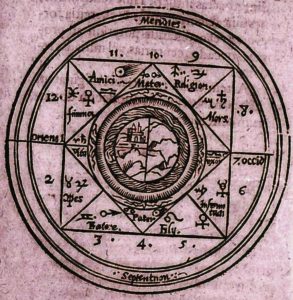
It is perhaps quite clear to see how possessing such a belief would have met with immediate condemnation from the Church. Firstly, Bruno’s belief that all matter and all souls were comprised of the same substance would have been anathema to the Christian principle that mankind, God and Christ are vastly separate beings. Furthermore, the concept of “magic” alone was certainly forbidden by 16th century Catholicism.
But one thing that becomes immediately impressionable is how nearly contemporary Bruno’s philosophy appears in relation to some of our more present ways of looking at the universe. Take for example, an idea put forth by advanced physics; that of Quantum Theory. If we take a subject such as Quantum Consciousness, wherein classic mechanics fail to account for the atypical qualities and behaviors of interchanging states of matter and the effect of consciousness upon the results of certain experiments, Bruno’s philosophy –his theology— equally seemed to embrace the nature of the idea of the “Universe as Mind”; a cosmology wherein the presence of the finite was found to exist at precisely the same center as the infinite.
To further illustrate Bruno’s cosmological philosophy, in one of his more well-known works, De Triplici Minimo et Mensura (On the Triple Minimum and Measure), his principle subject was in fact the threefold nature of reality wherein the same “measure” was used to define the nature of existence from the most vast to the microscopic. The first “minimum” indicated the center of divine unity, above all and within all; a Monad. The second “minimum” was the mathematical of geometric point (punctum). The third “minimum” was represented by physical atoms. Through this cosmological structure of unity, it could be said that Bruno contended that the divine Monad, the mathematical Monad and the physical Monad were synonymous; a central point shared by each “level” of existence, albeit each expressing a different reality from its outlying appearance.
It is along these lines where several of the geometric illustrations which accompanied Bruno’s De Triplici Minimo et Mensura become relevant. In two of the examples presented below, we see 3 common elements appear: a square, a hexagram and a circle. In the 3rd, we see a hexagram tilted at exactly 15 degrees.
It is interesting to note that in most Western hermetic traditions that of these symbols, the square was accepted to represent the physical Earth, the hexagram representing the 5 classical planets and the Moon with the Sun at its center, with the circle representing the Divine monad. It is here, with these three inter-connecting shapes, where we would seem to find a parallel with Bruno’s belief that the three “minimums” (the divine, the geometric punctum and the physical atom) all hold the same center.
Giordano Bruno may have been considered a heretic during his time, but his work has since gone on to inspire many others; in the realm of science, in the realm of philosophy, in modern hermeticism and elsewhere.
~ by MW Team Writer: Hayward Gladwin
Copyright 2017 by Hayward Gladwin. All Rights Reserved.
.


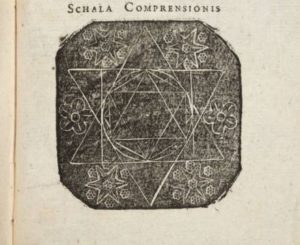
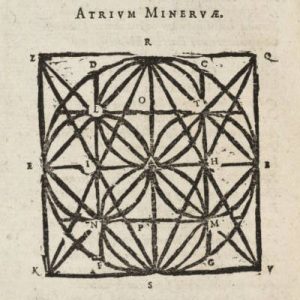
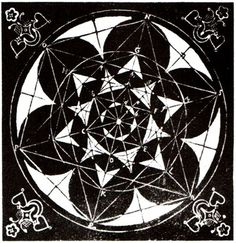
Like the way Giordani Bruno thinks, no wonder they kicked him out of the Church.
Life would be boring without the direct Cosmic guidance. Nobody needs a middle man to live fully but a majority of people just need a simple story to understand esoteric information. Neither good of bad it’s just trying to make the information available to many levels of consciousness.
Tesla’s map to multiplication is interesting too: http://www.intmath.com/blog/wp-content/images/2016/06/tesla-map-to-multiplication.jpg
Interesting that the map you linked to contains components of the triangle and square such as in the article and the ‘hexagram key’. But what it really seems to involve is the dispersion of regular polygons divided around a circle.
I agree with about the difference between the esoteric and religion. Religions have, in many ways, preserved and contained “mysteries” of an esoteric nature, much in the same way as ancient mythologies (although not necessarily without rites of worship, etc.). So it begins to get difficult about implicating what is right and what isn’t IMO. The external religion can reflect the inner teachings and the inner teaching, the outer. The important thing I think is to recognize that both exist. The problem I believe, in any case, is with dogmatism and interpretations which pick and chose when to be literal and when to be metaphoric for the sake of influencing public belief.
Hayward, dogmatism works both ways.
This article puts a blame on the Roman Catholic Church (deserved in that era, yes, but not today). But there’s a bigger point to make than Catholic bashing, something that’s become far too popular in modern times.
It wasn’t just to influence faith. At that time, the Church was, for all practicality, a government of society.
A BIG GOVERNMENT of society. They used the religious doctrines as a means to control people. JUST LIKE every other big government. Because that was their belief.
What’s really the difference between them and communism as a social control mechanism? Only the dogmatic means of control.
These problems are never really about religion, they are about social controls gone too far. Religion was/is only a means, just like the various forms of socialism or any other means of control. Any other BELIEFS.
Because it’s a lot easier to run things if you can just tell people what’s what and enforce it through law and regulation.
I’m not saying we don’t need law and regulation, I’m saying people with too much power take it too far and start to ignore the individual for the sake of THEIR whole. Religious or otherwise.
Hi Buckeye-
Respectfully yes, but the means of controlling society was through the issues of faith, and those were the grounds for which such sentences to death were being made. Heretics such as Bruno were sentenced to death for holding a position that was contrary to the Church authority, and particularly when they weren’t willing to recant their positions of faith.
In recognition of the societal control that the church was engaged with at the time, and I don’t dispute this, it begins to sound like you are saying that the church was simply used religion as propaganda, without any biblical or spiritual relevance. It is an interesting position, and I do think it has some merit, albeit I do believe it is not entirely true, because you can’t simply wipe out an entire people’s faith in something simply for the sake of political reasons (which, incidentally, was what the church in the middle ages had attempted to do in many instances).
For placing blame on the RCC of the middle ages, it is simply a matter of fact. I’m not sure if you are insinuating that I am being dogmatic for relating an account of what happened, but if so, then maybe we should just strike history altogether and paint a pretty picture for ourselves in the present so we can feel good about it? If relating the fact that the Roman Catholic church took a position which lead to uncountable deaths of “heretics” throughout the ages is considered to be “bashing” then they have only themselves to hold accountable. There were the Bogomils, the Cathars, the Templars, the Manichaeans, the Mandaeans, etc. Was it for political control? Yes. But again, on what were the justifications based? On the grounds of faith. Because faith was huge; and to control and influence this was a great power. Today? meh, not so much right? Today we could say that societal control is purely economic; and maybe this could be understood as our present religion.
We know in the present that the Church has since loosened its position on such matters (obviously we live in a different era- and, they don’t have as much influence any longer since, as it turns out, fewer and fewer people seek fulfillment through religion, perhaps because more people see less value in “faith” it seems). Since then, the church has even exonerated some figures, such as the Templars.
So to remove religion, or faith, from the equation entirely seems false to me, since the power the church possessed rested on it for this very matter.
My purpose for the article was to use a position that is more frequently considered (Christianity) to potentially lead to an understanding of a belief that was, apparently, “anti-” christian at the time. Not really an underestimation of Church societal control, but more so to raise the theological distinctions at play.
And, to indicate something specific that Bruno had believed in.
But the truth is that the church was at war with Gnosticism over the past 2000 years. If it isn’t now, then we can at least in the present spend some time trying to understand “why”?
Hayward, I think Gnosticism, religion in general, and science and how it relates is a fascinating subject.
I just don’t want the argument that someone else did something wrong in a different world of the past as a foundation to that subject.
I see that’s not your intent. But that doesn’t come clear, so I thought I’d make my point. I didn’t mean to say that -you- were Catholic bashing, it’s just that this is a thing in modern times where people bring up the sins of the past, in a different world, and just leave it at that and the inference (intentional sometimes) is that the Catholic Church should be placed among the groups to hate and defeat. And where we are going as a result isn’t going to be pretty unless a person likes to be controlled in all ways (and fund it too).
Honestly, I need to read up on Gnosticism to be able to discuss it. I’ve done some reading but I need more time so that I can see where you are coming from. Please do continue though. I’d like to discuss it as I am able.
Hi Buckeye-
I see your point about not wanting to establish the subject of Gnosticism on a base of “wrongdoing”, especially since today we are mostly pretty open about such subjects. I guess I take the record of history too much for granted as a place to begin that discussion since, honestly, I have a hard time finding another place to begin that discussion.
There are tenets of it that do survive but for me it seems more direct (perhaps wishful thinking) to look to the subject as a product of its time.
But then again, although we do have this history to reflect on and we can embrace such alternative beliefs in the present I also have to lament a little bit though with the thought that such beliefs really werent given a fair opportunity. There were rich cultures there and perhaps equal to something similar as the quelling of Native American culture in America, we have to look back every once in awhile and remember what happens when we take our concepts of sovereignty too far.
I appreciate your feedback and will try to make the point more poignantly objective next time and that intent more clear.
Truth is I have deep respect for all religions; the actions of human beings as being swayed by events of their time, nonwithstanding.
Thank you–
Hayward, I think it’s ok to talk about the history, but in today’s climate I think that if you do, you also need to make the statement clearly that mankind is moving past that sort of thing, and put the blame squarely on the time period and where man was.
Humanity still has a ways to go, of course. We still live with fears that can cause bad reactions. But slowly, we move forward. It’s a hard and bumpy road, we have to understand this.
And thank you. This is a worthy effort to bring more spirituality to the forefront.
I hear you loud and clear Buckeye, and your point is well taken.
Thanks Hayward for yet another fascinating article! Amazing how so many Sacred Designs can be found throughout nature. Timeless foundations and elements!
Thanks again Jenny! Always a privilege!
He is missing lines in the atrium m thing, is he not? The image is not complete?
And the last flower thing is missing several tiers. But I suppose that doesn’t hurt the math.